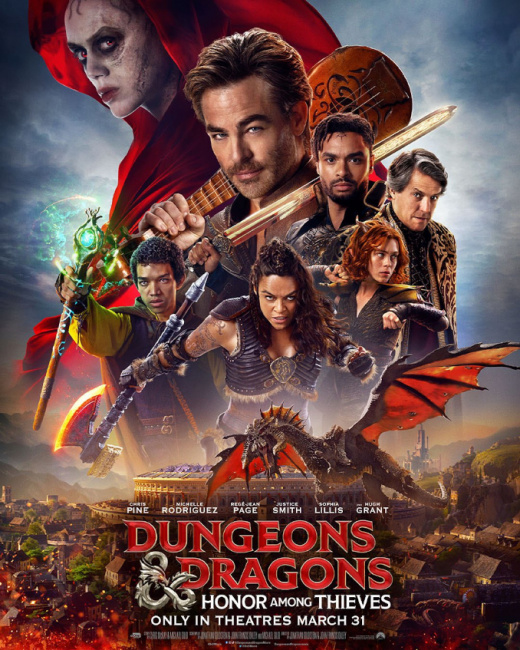Rolling for Initiative is a weekly column by Scott Thorne, PhD, owner of Castle Perilous Games & Books in Carbondale, Illinois and instructor in marketing at Southeast Missouri State University. This week, Thorne reviews some of the complaints about Dungeons & Dragons: Honor Among Thieves, and pays tribute to Klaus Teuber.
Showing the relative size of the RPG and video game markets (even though all of the fantasy video games have their roots in Dungeons & Dragons), the Super Mario Bros. Movie opened with a $31 million box office on Wednesday and most analysists expect it to gross over $140 million by the end of the weekend. By comparison, Dungeons & Dragons: Honor Among Thieves took in over its opening weekend a bit more than what Super Mario Bros. grossed in one day (see “$2000 to $4000 to $40 Million“). Though it is nice to see all the fan awareness of D&D, RPG awareness is still pretty insignificant compared to the market presence created by popular video game IPs.
Of course, there was some carping by avid D&D players about some things in the movie. The lack of Saving Throws though? The Saving Throw was always an abstract concept designed to replicate the hero making a death-defying escape from danger at the last minute. Even Indiana Jones made a saving throw nearly every 10 minutes in each of his movies.
A somewhat more annoying problem is the lack of acknowledgement of the creators of D&D in any of the credits in the movie, as parodied by John Kovalic in the current Dork Tower run of strips. Hasbro gets credited as the source of Dungeons & Dragons, but no mention of either TSR or Wizards of the Coast. I believe Kim Mohan is cited as an advisor to the movie (see “D&D Fireside Chat and RIP Kim Mohan“), but there is no reference in the credits to Gary Gygax, Dave Arneson, Ed Greenwood or any of the other luminaries that brought the game to life. Even the characters from the Saturday morning D&D cartoon make a cameo appearance during the maze sequence, which is pretty cool, so how hard would it be to either credit them at the end or work in a reference to them during the film itself.
On a sad note, Klaus Teuber, the creator of Setters of Catan, later CATAN, passed away this past week after a short illness (see “RIP Klaus Teuber“). Settlers of Catan was the first of the Eurogames, which relied more on strategic play and less on chance, to sell successfully in the U.S. NPR ran an obituary for Teuber this week, replaying part of his 2020 interview with Rob Schmitz. Catan had its roots in the pretend battles Teuber waged as a child with toy soldiers over fields, woods, and mountains. However, Catan grew out of his boredom with his job as a dental technician. Spending his free time in his basement developing games, his first games won three Spiel des Jahres awards, but sales tapered off quickly.
Inspired by stories of the Vikings and what they would need as they explored and colonized, he developed Settlers of Catan, originally a much more sprawling game than the single island in the core set (the other pieces were eventually added as expansions such as Seafarers of Catan and Cities and Knights). Core tenets of the game were that no-one could ever be eliminated from play and players could take actions on every one’s turn, ensuring no one spend time just sitting there. The game worked, and has sold over 30 million copies since its introduction in 1995. I remember stocking the game back in 1995, wondering if boardgames would fit into our product mix of RPGs and miniatures, since our customers at the time showed no interest in boardgames. It did and we have sold CATAN for over 25 years. Thank you, Mr. Teuber for all the fun and sales over the years and yes, I will trade you “rock for sheep.”
Comments on the D&D movie or Catan? Send them to castleperilousgames@gmail.com.
The opinions expressed in this column are solely those of the writer, and do not necessarily reflect the views of the editorial staff of ICv2.com.
Source: ICv2



